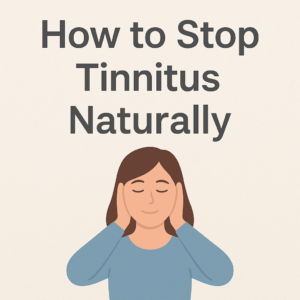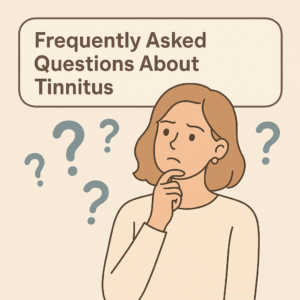Health and Vitality Blog
How to Stop Tinnitus Naturally: An In-Depth Guide to Easing the Ringing


What Is Tinnitus and Why Is It So Common?
Tinnitus is often described as a persistent sound in the ears — like ringing, buzzing, clicking, or hissing — that doesn’t come from an external source. It can be temporary or ongoing, soft or loud, and for many people, it becomes more noticeable in quiet environments, like when falling asleep.
While it may not be dangerous, tinnitus can be distracting or even distressing. Understanding it better can be the first step to managing it naturally.
What Does Tinnitus Feel Like?
Not everyone experiences tinnitus the same way. Some people hear:
High-pitched ringing
A low-frequency hum
Clicking or pulsing sounds
Buzzing, similar to electrical noise
Ocean wave-like whooshing
The volume and pattern may change throughout the day or remain steady. This unpredictability is part of what makes it so frustrating for many.
What Causes the Ringing in the Ears?
There’s no single cause. Many people never find a clear trigger. However, some of the most commonly associated factors include:
Long-term exposure to loud sounds
Stress or fatigue
Natural changes as we age
Changes in daily routines or sleep habits
Overexposure to digital screens or headphones
Tinnitus can also emerge during quiet moments when the mind is finally free from distractions — which is why it often becomes more noticeable at night.
🔍 How to Get Rid of Tinnitus Sensations — Gently and Naturally
Let’s be clear: there’s no one-size-fits-all solution. But there are many daily habits, tools, and natural strategies that people have used to ease the intensity of tinnitus.
This isn’t about a miracle cure. It’s about learning how to manage your internal soundscape with consistency, patience, and calm.
🧘♂️ 1. Create Calm in Your Nervous System
Stress doesn’t cause tinnitus, but it can make it worse. When your body is in fight-or-flight mode, your brain may amplify internal sounds. Try daily routines like:
Deep breathing exercises (5–10 minutes/day)
Progressive muscle relaxation
Mindful walking or journaling
Over time, your nervous system may become less reactive — and with that, the ringing may seem less intrusive.
🎧 2. Use Sound to Your Advantage
Silence can make the ear ringing more obvious. Gentle background noise can help mask the sound. Here are some favorites:
White noise machines
Rain or ocean wave playlists
Soft instrumental music
Fan or humidifier noise
You can experiment with different sound textures to see what blends best with your perception of tinnitus.
🛌 3. Build a Tinnitus-Friendly Sleep Routine
A quiet room can be the worst environment for someone with tinnitus. Try this bedtime routine:
Lower lights an hour before sleep
Avoid screens for 30 minutes
Listen to calm ambient sounds
Focus on slow breathing as you lie down
Sleep itself won’t eliminate tinnitus — but better rest can support your brain’s ability to manage sensory input.
💧 4. Stay Hydrated and Nourished
Proper hydration and consistent nutrition help your body stay balanced. While no food eliminates tinnitus, staying fueled and hydrated may reduce sensations caused by fatigue or tension.
Drink at least 8 glasses of water daily
Avoid excessive caffeine, sugar, and alcohol
Eat regular meals to prevent energy crashes
Keeping your body in balance may help your ears feel more balanced too.
🏃 5. Move Your Body Daily
Movement isn’t just good for physical health — it’s good for focus, mood, and perception. When you move, you shift your attention and improve blood flow, both of which can positively affect how you experience tinnitus.
Options include:
Daily walks (especially in nature)
Stretching or yoga
Light strength training
Dancing or swimming
Even 15–20 minutes a day can make a noticeable difference over time.
🎯 6. Avoid Total Silence During Work and Study
If you work from home or study in silence, consider adding low-level background noise. You can try:
Lo-fi beats or study playlists
Brown noise (a softer version of white noise)
Nature soundtracks like wind, birds, or streams
Some apps allow you to layer sounds — experiment to find your optimal soundscape.
🚫 7. Watch Your Headphone Volume
One of the most preventable triggers of long-term ear ringing is consistent exposure to loud headphones. If you use earphones:
Follow the 60/60 rule: max 60% volume for no more than 60 minutes
Use over-ear headphones instead of in-ear ones
Avoid listening in noisy environments (which leads to raising the volume)
Protecting your ears now can make a big difference in how you feel later.
🧠 8. Keep Your Brain Busy
A distracted mind is less likely to focus on internal noise. Tinnitus often feels louder when we’re idle or bored. Try to engage in:
Creative hobbies (drawing, music, DIY crafts)
Puzzles, sudoku, or strategy games
Reading interesting books
Learning a new language or skill
Mental engagement can shift your focus outward — away from the sounds inside.
🛑 9. Set Boundaries With Devices
Screen time overload is a common issue today. Too much scrolling, video consumption, or headphone use can heighten awareness of internal noise. Create daily boundaries like:
No screens for the first hour after waking
Set “tech-free” breaks every few hours
Avoid binging content with high volume and fast pacing
Digital rest is underrated — but it may help quiet your mind and ears.
🔄 10. Build a Daily Routine That Supports Calm
Routine is comforting. The more your day flows with stability, the less your brain may obsess over small sensory disturbances. A sample calm-supporting routine might look like:
Morning: light movement + hydration
Afternoon: focus work with background audio
Evening: relaxation + screen detox
Night: sleep hygiene + quiet time
Consistency over intensity is key.
✨ FAQ: Tinnitus Lifestyle Questions
Q: Can tinnitus really go away naturally?
A: For some people, yes — especially when it’s caused by temporary factors like fatigue or sound exposure. For others, it becomes less noticeable with time and stress management.
Q: Should I mask the sound all the time?
A: Not necessarily. Masking can help during tough moments, but some experts recommend letting the brain “habituate” naturally. Use sound support when needed, but don’t feel dependent on it.
Q: What if my tinnitus gets worse during stress?
A: That’s very common. Managing your nervous system through breathing, routine, and movement may help reduce this cycle over time.
🧩 Conclusion: There Is No Magic Button — But There Is Hope
If you’ve been Googling “how to stop tinnitus” or “best tinnitus treatment,” you’ve probably seen a mix of products, opinions, and quick-fix promises.
This guide avoids all of that.
You don’t need a gimmick. You need a strategy — one built around rhythm, rest, awareness, and consistency.
You may not eliminate tinnitus entirely. But you can reduce how much it bothers you. You can build a routine that makes your soundscape feel calmer, safer, and quieter.
That’s the path forward. And it’s already in your hands.
🔍 Related Searches People Ask:
best background noise for tinnitus
how to stop ringing in ears naturally
calming rituals for ear noise
lifestyle changes for tinnitus relief
how to sleep better with ear ringing
why does tinnitus get worse at night
natural ways to reduce ear buzzing

📚 Additional Insights on Tinnitus: Questions People Often Ask
🕯️ Why Does Tinnitus Feel Worse at Night?
Many people report that their tinnitus becomes more noticeable during nighttime. But why is that?
At night, our surroundings tend to be quieter. There’s less traffic, fewer distractions, and your mind is no longer focused on work, notifications, or conversations. In this silence, internal sounds like ringing or buzzing become more apparent.
Also, fatigue can heighten the brain’s sensitivity. If you’re physically or emotionally drained, your perception of internal noise may be amplified.
Tips:
Use soft ambient sounds while preparing for sleep
Avoid complete silence — even a light fan can help
Do a calming ritual (like reading or stretching) before bed
🧠 Does Stress Cause Tinnitus?
Stress doesn’t directly cause tinnitus, but it can trigger or intensify the way it feels.
When your nervous system is on high alert — during anxiety, burnout, or high workload periods — your brain may “tune in” more closely to background sensations. That includes internal sounds.
Managing stress may not remove tinnitus, but it can reduce how much attention your brain gives to it.
Try this:
Deep breathing for 4 counts in, 4 counts out
Nature walks without headphones
Gentle mindfulness apps (try ones without spoken voice, just soft tones)
🎧 Should You Use Headphones If You Have Tinnitus?
Using headphones is not off-limits — but you need to be mindful of volume levels and listening duration.
Tips to stay safe:
Never exceed 60% volume
Use over-ear headphones (they distribute pressure more evenly)
Take regular breaks (every 30–60 minutes)
Avoid using headphones in loud environments (like the gym)
Too much headphone use — especially at high volume — is one of the most common long-term triggers for ear sensitivity.
🕰️ Can Tinnitus Come and Go?
Yes. For many people, tinnitus is not constant. It may appear:
After a loud event (concerts, traffic, headphones)
During times of high stress
After poor sleep
During quiet moments
The perception of tinnitus can vary daily, or even hour to hour.
Over time, some people find their brain adapts — and the noise fades into the background more easily.
🧪 Is There a Test or Diagnosis for Tinnitus?
This article is focused on self-care and natural strategies, so we don’t explore medical diagnostics. But many people find that simply tracking their lifestyle — diet, sound exposure, stress levels — helps them notice patterns in their tinnitus.
Start a simple tracker:
When does the sound feel louder?
What were you doing before it started?
How did you sleep the night before?
What sounds help you mask it?
Creating awareness can help reduce the feeling of helplessness and offer more clarity.
🔄 Is Tinnitus Forever?
For some, tinnitus fades over time. For others, it becomes something they notice less and less — even if it never completely disappears.
The key is building a calm environment, supporting your focus, and creating routines that protect your ears and ease your mind.
You may not “cure” tinnitus — but you can train your brain to care about it less.
🧩 Final Thoughts: You Are Not Alone
If you’ve found yourself searching things like:
“how to get rid of ear ringing”
“what causes constant buzzing in ears”
“can I live normally with tinnitus”
…know that millions of people ask the same questions every month.
And thousands have built peaceful, happy, focused lives — even with tinnitus as part of their soundscape.
You’re not broken. You’re not stuck. You’re just learning how to listen differently.
Copyright 2025 by Vitality Health Blog
All rights reserved.
The information on this website is intended for informational purposes only and should not replace advice from a qualified medical professional. We strongly encourage you to consult your physician before making any lifestyle changes and discuss them thoroughly. If you have any medical concerns or conditions, please seek guidance from your doctor.
It is advisable to conduct your own research and confirm details with multiple sources when exploring health-related topics. Always consult with your healthcare provider to carefully evaluate any protocols or recommendations mentioned on this website or associated with the product promoted here.
This site’s content is not a substitute for professional medical advice, diagnosis, or treatment. Always seek advice from a licensed healthcare provider for any health concerns.